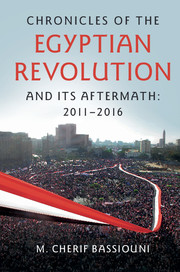Book contents
- Frontmatter
- Dedication
- Contents
- Preface
- Acknowledgments
- List of Abbreviations
- Introduction
- 1 The Early Stage of the Revolution
- 2 Mubarak Relinquishes the Presidency and the SCAF Assumes Power
- 3 A Prelude to Democracy: 2011–2012 Elections
- 4 The Morsi Presidency: June 30, 2012 to July 3, 2013
- 5 The Military's Return to Power and the El-Sisi Presidency
- 6 2015Legislative Elections and the Changing Civilian Political Landscape
- 7 The Military Institution: Its Power, Influence, and Culture
- 8 Violence and Repression
- 9 The Accountability Gap
- 10 The Justice System in Crisis
- 11 The Constitutional Quagmire
- 12 Demographics, Education, and the Economy
- 13 Geopolitical Factors
- 14 Concluding Assessment
- Pictures of the Egyptian Revolution and Related Events
- Bibliography
- Index
6 - 2015Legislative Elections and the Changing Civilian Political Landscape
Published online by Cambridge University Press: 24 November 2016
- Frontmatter
- Dedication
- Contents
- Preface
- Acknowledgments
- List of Abbreviations
- Introduction
- 1 The Early Stage of the Revolution
- 2 Mubarak Relinquishes the Presidency and the SCAF Assumes Power
- 3 A Prelude to Democracy: 2011–2012 Elections
- 4 The Morsi Presidency: June 30, 2012 to July 3, 2013
- 5 The Military's Return to Power and the El-Sisi Presidency
- 6 2015Legislative Elections and the Changing Civilian Political Landscape
- 7 The Military Institution: Its Power, Influence, and Culture
- 8 Violence and Repression
- 9 The Accountability Gap
- 10 The Justice System in Crisis
- 11 The Constitutional Quagmire
- 12 Demographics, Education, and the Economy
- 13 Geopolitical Factors
- 14 Concluding Assessment
- Pictures of the Egyptian Revolution and Related Events
- Bibliography
- Index
Summary
THE 2015 LEGISLATIVE ELECTIONS
The 2015 legislative elections were held in November and December, with 596 seats open, of which 448 were reserved for individual candidates, 120 for electoral lists, and twenty-eight to be appointed by the president. Voter turnout for the first two rounds was low at only 28.3 percent, even though the government tried to stimulate voter participation by allowing a half-day off from work for state employees, encouraging a half-day for private employees, and threatening a fine for not voting. There was a rerun for thirteen seats in the third round, and the appointment of the twenty presidential seats came later in December. On December 31, the president announced his twenty-eight appointees pursuant to Article 102 of the 2014 Constitution. Among them were thirteen women, one of whom was under the age of 30. One of them was the head of a political party – the left wing Tagammuc – and as such does not fall within the categories that the president is allowed to appoint under Article 102. The ages of the appointees ranged from 29 to 70. Of those, nine were academics. Of the estimated 5 million Egyptian expatriates, none were appointed. Aside from these appointments, the new legislature is composed of 237 party-affiliated candidates and 331 independents, representing 568 of the 596 seats available. The distribution of seats to candidates who represented parties is shown in the table below.
The electoral coalition list “For the Love of Egypt” won every seat in both rounds of the list elections by large margins. Opposition parties expressed their criticism and suspicion, particularly the Salafist al-Nour party, whose representatives won only eleven seats when in the 2012 elections they had won 121 seats, obtaining 24 percent of the vote.
Of those elected, there were:
In a press release, the US Department of State noted the integrity of the elections, but stated concern about low voter turnout and “limited participation by opposing parties.” But that assertion became questionable after certain revelations were made in 2016 about the role of the GIA in selecting the candidates.
- Type
- Chapter
- Information
- Publisher: Cambridge University PressPrint publication year: 2016



